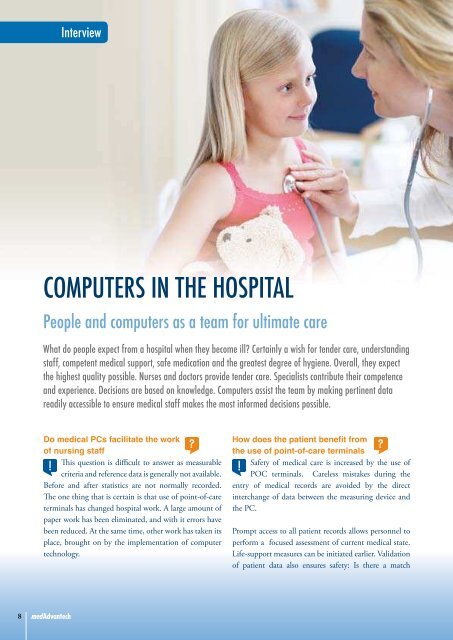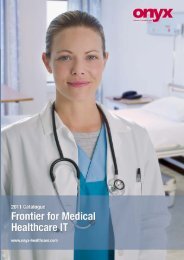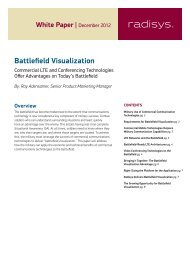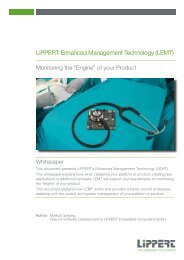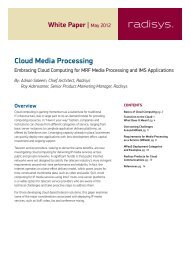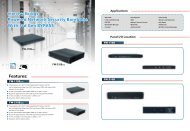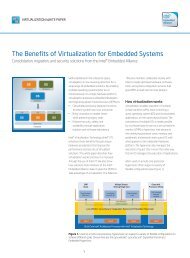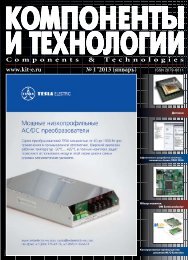Knowledge helps healing - Embedded Community - Intel
Knowledge helps healing - Embedded Community - Intel
Knowledge helps healing - Embedded Community - Intel
You also want an ePaper? Increase the reach of your titles
YUMPU automatically turns print PDFs into web optimized ePapers that Google loves.
interview<br />
CoMpuTeRs in The hospiTal<br />
people and computers as a team for ultimate care<br />
what do people expect from a hospital when they become ill? Certainly a wish for tender care, understanding<br />
staff, competent medical support, safe medication and the greatest degree of hygiene. Overall, they expect<br />
the highest quality possible. Nurses and doctors provide tender care. Specialists contribute their competence<br />
and experience. Decisions are based on knowledge. Computers assist the team by making pertinent data<br />
readily accessible to ensure medical staff makes the most informed decisions possible.<br />
Do medical PCs facilitate the work<br />
of nursing staff<br />
This question is difficult to answer as measurable<br />
criteria and reference data is generally not available.<br />
Before and after statistics are not normally recorded.<br />
The one thing that is certain is that use of point-of-care<br />
terminals has changed hospital work. A large amount of<br />
paper work has been eliminated, and with it errors have<br />
been reduced. At the same time, other work has taken its<br />
place, brought on by the implementation of computer<br />
technology.<br />
How does the patient benefit from<br />
the use of point-of-care terminals<br />
Safety of medical care is increased by the use of<br />
POC terminals. Careless mistakes during the<br />
entry of medical records are avoided by the direct<br />
interchange of data between the measuring device and<br />
the PC.<br />
Prompt access to all patient records allows personnel to<br />
perform a focused assessment of current medical state.<br />
Life-support measures can be initiated earlier. Validation<br />
of patient data also ensures safety: Is there a match<br />
between the patient in the bed and the the one on file,<br />
and is the data entered plausible? The medical expertise<br />
of a doctor cannot be replaced by a system, but the<br />
system can be used to augment professional competence<br />
by providing rapid access to reliable data.<br />
What are the<br />
advantages for the hospital<br />
The quality of medical work has become more<br />
transparent, and quality improvement measures<br />
have become possible only by processing patient<br />
data electronically. Comprehensive quality checks,<br />
for example, for organ donations or medication<br />
administration are simplified by electronic data<br />
acquisition. Statis-tical analysis assists in the procedural<br />
improvements. Duration of confinement to bed, state of<br />
the patient when released, and mortality rates are quality<br />
attributes that flow into comparisons of clinics. Medical<br />
verifications to health insurance funds or during court<br />
proceedings can be provided faster and more easily. All<br />
in all, electronic patient data processing can save costs.<br />
The savings potential contributes to cost-efficient clinic<br />
management.<br />
What are the risks and side-effects<br />
The introduction of medical IT systems has<br />
progressed in different ways, from one clinic to<br />
another. Universal standards do not exist and patchwork<br />
and isolated applications can lead to expensive dead ends.<br />
Implementation can be difficult if there is resistance<br />
or lack of experience from IT. At the same time, since<br />
every IT system is continually evolving, there is an<br />
ongoing need for maintenance and care. Normalization,<br />
standardization and uniform quality specifications are<br />
still in their infancy.<br />
Are there any limits<br />
No system in the world will replace medical<br />
competence. But IT can advance medical treatment<br />
and promote innovative ideas. In this way, technology<br />
promotes the recovery of patients, <strong>helps</strong> physicians and<br />
nursing staff in their work, and offers transparency for<br />
insurance companies and hospital operators.<br />
Interview conducted by Frauke Frerichs-Waldmann,<br />
Diplom-Ingenieur, makomti<br />
Dr. Lukas Streit holds a doctorate degree as an intensive<br />
care physician. He works in the intensive care unit at<br />
the Inselspital in Bern. Besides his work as intensive<br />
care physician, he is an active member of the research<br />
team and manages the IT department for the intensive<br />
care unit. Medicine and informatics are equally near<br />
and dear to him.<br />
Inselspital University Hospital Bern<br />
The Inselspital is one of the most eminent university<br />
hospitals in Switzerland; it is a figurehead for the<br />
Canton Bern. It is a medical competence, high-tech<br />
knowledge center with an international reputation.<br />
The staff master the variety of tasks in medicine,<br />
education and research with creativeness, inventive<br />
talent, commitment and perseverance. The patients<br />
are always the center of attention. Humane and<br />
technically outstanding medical and nursing care<br />
of patients is the ultimate ambition of the roughly<br />
7,000 staff members, who care for more than<br />
220,000 patients each year.<br />
1 st 8 1 issue 2011 9<br />
st issue 2011


